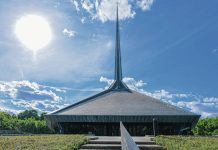Watching the “Columbus” film can start an interesting conversation. Do you have a list of your top five favorite Columbus buildings? But the film also calls into question if the denizens of our fair city even pay much attention to or know the history of the amazing buildings in our midst.
Although that may be true, I really think that most of us appreciate that we live and work in a unique landscape. But even if it is at a subliminal level, the modern architecture impacts life in Columbus.
The buildings of Columbus connect us to the past. They ask us to consider the time of their design and construction. What was happening in Columbus, the nation and the world at that time? They stand as legacies to their designers, their patrons and the residents of Columbus. The “Columbus” movie reminded me that the modern architecture is simultaneously the background setting of our daily lives as well as inspirational works of art.
But the modern architecture also asks us to consider the future. What is your reaction to their aesthetic? How does Columbus continue this design legacy? How will Columbus continue to set itself apart? After all, not every Indiana city has been the subject of a movie.
To contemplate where Columbus has been and where it might be going, the University Library of Columbus, Ivy Tech Community College and Phi Theta Kappa (the student honor society for two year colleges) are starting a series of panel discussions titled, “Columbus: Past, Present, and Future.” The public is welcome to all of these discussions.
The first discussion, “Columbus Past,” is 7 p.m. Oct. 19, at in the Columbus Learning Center, 4555 Central Ave. The discussion of local history will feature a wide range of topics. Panelists include Greg Lewis, the Social Studies Department chair at Columbus East High School. Lewis will be discussing Gen. John Bartholomew and Gen. John Tipton. Also joining the conversation is Dr. Tamara Iorio, physician and local author. Iorio will examine photographs of the past. Adam Rediker, education manager of the Bartholomew County Historical Society, will be looking at pre-industrial Columbus. Panelist David Sechrest, Columbus historian, is also on the panel. Sechrest will explore the history of the Pump House. Historic landmark Zaharakos will provide free dessert at the event. After all, what is a good conversation about history without a tasty snack? Feel free to join the conversation with questions, comments and memories.
Satisfying a hunger for history does not require a trip across the country. Whether touring the Atterbury-Bakalar Air Museum, taking pictures of the Camp Atterbury Italian Prisoner of War Chapel or strolling across the New Brownsville Covered Bridge, there is a chance to touch the past in our community.
Like many others in Columbus, I was saddened to hear about the recent death of Harry McCawley. He was undoubtedly the dean of Columbus history. Although I never had the pleasure of working with him, I was a fan of his work. I admired his vast knowledge of the community, as well as his deftness as a writer. He did important work. He preserved the memories of our community. He shared that knowledge with the rest of us. We are fortunate to have someone who cared so much about Columbus history.
Local history does not get enough attention. Too often historical narratives feature presidents, kings and generals while ignoring the daily triumphs and tragedies of average women and men. These are the stories that Harry McCawley told. Our own local history has influenced national and world events. The first installment of “Columbus: Past, Present, and Future” will highlight the importance of history at the community level.
The follow-up panel, “Columbus: Present,” is scheduled for 7 p.m. Jan. 25 in the Columbus Learning Center, while the discussion of Columbus’ future will take place at 7 p.m. March 29 in the Columbus Learning Center.
Aaron Miller is one of The Republic’s community columnists and all opinions expressed are those of the writer. He has a doctorate in history and is an associate professor of history at Ivy Tech Community College — Columbus. Send comments to [email protected].




